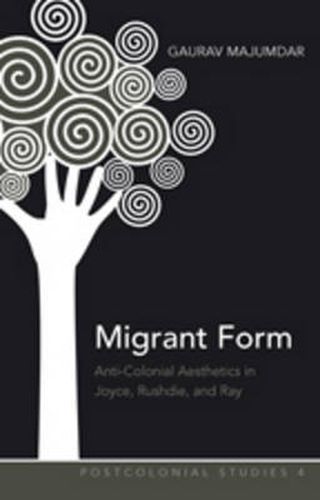Readings Newsletter
Become a Readings Member to make your shopping experience even easier.
Sign in or sign up for free!
You’re not far away from qualifying for FREE standard shipping within Australia
You’ve qualified for FREE standard shipping within Australia
The cart is loading…






This title is printed to order. This book may have been self-published. If so, we cannot guarantee the quality of the content. In the main most books will have gone through the editing process however some may not. We therefore suggest that you be aware of this before ordering this book. If in doubt check either the author or publisher’s details as we are unable to accept any returns unless they are faulty. Please contact us if you have any questions.
Migrant Form examines the works of James Joyce, Salman Rushdie, and Satyajit Ray for the anti-colonial arguments in their unsettled, and unsettling, aesthetics. Among the questions it engages are the following: What are the aesthetic moves through which art expresses its resistance to dominance and demands for conformity? How can we define anti-colonial aesthetics? How do these aesthetics manifest themselves in different media such as literature and film? Contending that Joyce inaugurates an anti-colonial aesthetics of reconstitution , the book mines such aesthetics in Ulysses and Finnegans Wake to propose a formal model for postcolonialism. It also draws on that exercise to consider how Rushdie extends a play with reconfigured forms into an overt politics in two of his novels (Midnight’s Children and The Satanic Verses). Turning its attention to film, the book contests the common view of Ray as a gentle realist and examines a formal restlessness in Ray’s earlier work, Charulata (The Lonely Wife), before demonstrating how Ray stages his preference for restlessness in his final film, Agantuk (The Stranger).
$9.00 standard shipping within Australia
FREE standard shipping within Australia for orders over $100.00
Express & International shipping calculated at checkout
This title is printed to order. This book may have been self-published. If so, we cannot guarantee the quality of the content. In the main most books will have gone through the editing process however some may not. We therefore suggest that you be aware of this before ordering this book. If in doubt check either the author or publisher’s details as we are unable to accept any returns unless they are faulty. Please contact us if you have any questions.
Migrant Form examines the works of James Joyce, Salman Rushdie, and Satyajit Ray for the anti-colonial arguments in their unsettled, and unsettling, aesthetics. Among the questions it engages are the following: What are the aesthetic moves through which art expresses its resistance to dominance and demands for conformity? How can we define anti-colonial aesthetics? How do these aesthetics manifest themselves in different media such as literature and film? Contending that Joyce inaugurates an anti-colonial aesthetics of reconstitution , the book mines such aesthetics in Ulysses and Finnegans Wake to propose a formal model for postcolonialism. It also draws on that exercise to consider how Rushdie extends a play with reconfigured forms into an overt politics in two of his novels (Midnight’s Children and The Satanic Verses). Turning its attention to film, the book contests the common view of Ray as a gentle realist and examines a formal restlessness in Ray’s earlier work, Charulata (The Lonely Wife), before demonstrating how Ray stages his preference for restlessness in his final film, Agantuk (The Stranger).